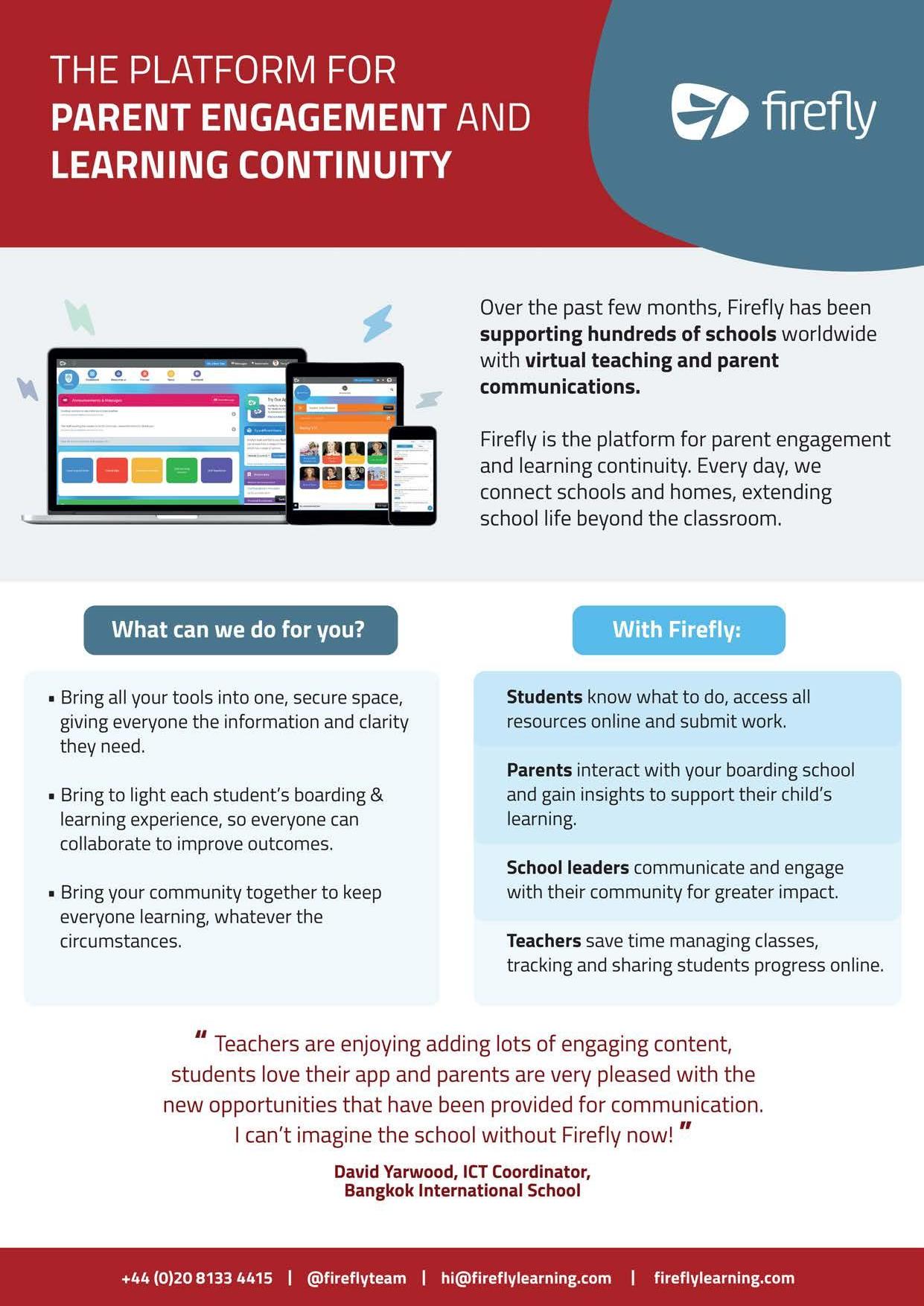
16 minute read
WEll-rouNDED, SuCCESSFul AND uTTErly FulFIllED
Jemima Edney
Head of Boarding and Co-Curricular City of London Freemen’s School
I grew up in the 80s and 90, a time that is not always remembered as the golden years for boarding. Boarding has, for some years now, occasionally been in the headlines for all the wrong reasons, and from this has grown a one-sided view of boarding schools, their staff, and even the parents that send their children to board. This is far from balanced, and gives little consideration to the outstanding work that has gone on in recent years to hugely enhance the experience for boarders today.

So I am on a mission to to tell my own very positive stories of boarding and I hope it may encourage others to share theirs. I know more than a little bit about boarding having begun my boarding life aged seven in a small prep school in the South East of England. This was the start of a journey that took me through my school years and later into a career in boarding schools and now into boarding leadership.
I came from a musical family, and showed some early signs of talent, so my parents chose a school that would best support my development, despite a 45-minute journey from where we lived. There were schools closer to home of course as growing up in the heart of Surrey meant that there was a huge choice of excellent state and independent schools I could have joined.
opportunities that were at my fingertips at boarding school. I emerged as a well-rounded, successful and most importantly, utterly fulfilled 18 year old with tons of ability and experience. I was, and “I thrived at boarding school and I loved boarding. I couldn’t (and still can’t) understand why any child would turn down the opportunity to spend all day and all night with your friends But my parents were principled enough to put my seven-year-old needs before their own ease of life. As a mother of a six year old myself now, I understand how hard my parents must have found it to take that decision, what a wrench that would have been for the family, and how selfless it was of them to set me on the right path at the expense of having me at home every day. I thrived at boarding school and I loved boarding. I couldn’t (and still can’t) understand why any child would turn down the opportunity to spend all day and all night with your friends in a Mallory Towers (I considerably predate Harry Potter) adventure. My days were filled with music, sport, play and more play (and I suppose some lessons, but I don’t remember so much about those). A couple of years later, when my parents moved up to Scotland with my father’s job, boarding was a blessing for us all. I didn’t have to transfer schools, so the upheaval of moving country was counterbalanced with the security of staying in the same school with the friends and teachers I trusted and relied upon. I learned to get on with people – children and adults, I learned to play with children older and younger, to look after and be looked after, I learned to be bored and find entertainment. I was able to develop incredible musical skills I would not have found anywhere else and it turned out that I was also rather sporty. I flourished. When my prep school days were over, I moved on to another boarding school. Much larger, with more musical and sporting opportunities and of course, a greater focus on academic success. Having already boarded for five years, I breezed into the school and instantly became busy with evening sports training, weekend fixtures, early morning rehearsals and late-night concerts. Had I not been a boarder I dread to think how many miles my parents would have clocked up just trying to get me to half of the remain, immensely grateful for the opportunities afforded to me by those schools, and to my parents for putting aside their natural yearning to have me at home, in place of doing the very best for me through those challenging

childhood and adolescent years. Boarding had a huge impact on my life, and made me who I am, so it is perhaps no surprise that I came back to boarding life for a career. The market has changed in recent years and I come across many adults who know nothing about boarding life, or whose only understanding comes from recent media coverage. I believe it’s time to have the other side of the story heard – that boarding can be, and very often is, a hugely positive experience, that provision and care in boarding in 2020 is outstanding, that boarders are not children cruelly neglected by their parents – quite the opposite – they are the products of families who have put their child’s education first.
I can’t speak for every boarding school, but I can set out for you the reasons why I believe boarding in 2020 is a wonderful – no, outstanding –opportunity to develop wellrounded, successful and utterly fulfilled young people.

>>>
1 the luxury
I thought boarding in 1984 was pretty good – I would never have imagined some of the luxury and flexibility afforded to our boarders here at Freemen’s in the 21st Century. Long gone are the days of the dormitory. Our boarders are in rooms of 3 in Year 9, 2 in Year 10-12 and single rooms in Year 13. Pupils from Year 10 upwards have study desks in their rooms, as well as there being a prep room for pupils in Year 9 and 10. There are computers and printers available for use, a fully stocked kitchen for Year 11 and above, a lounge/kitchen for Year 9 and 10, TVs, gaming zones, laundry facilities, a wellbeing area, board games, a music room and acres of outdoor space. On the campus there is a fully equipped sports hall, swimming pool and music school. The buildings are modern, warm, light, happy spaces. Many of our leavers come back from university to tell us that their rooms are nowhere near as spacious, or that all freshers are in shared rooms. They are grateful they have had the chance to learn to cook and do their laundry themselves, as plenty of others arrive at university without a clue.
These days boarders have a great deal more freedom and flexibility. The mobile phone is a mixed blessing, but one of its positive features is the way it enables pupils and staff to stay in touch, so visits to town or friends’ houses, whilst more closely regulated in terms of safeguarding, are easily monitored by boarding staff and parents. A delayed train or cancelled bus no longer results in panicked phone calls reporting missing children, as they have themselves messaged to explain. Once all the correct processes are followed to ensure boarders remain in safe company and parents are happy with the arrangements, they have relative freedom away from the school site in their free time.
2 children love it
What child doesn’t love a sleepover, a residential camp or a school ski trip where they get to be with their friends day and night? Yes, there are times when they would like to be at home with their parents, especially when things aren’t going their way, or they are physically under the weather, but the vast majority of the time, children love to be with their friends 24-7. When I asked 12 of the boarders in my current boarding house for their comments on boarding at the school, every one of them said they love the relationships they build up with fellow pupils, often from different year groups, and they value the relationships they build with staff. They genuinely enjoy being part of a big community where they learn from one another, through cultural sharing, through supporting one another academically and emotionally, and they learn how to develop safe and respectful relationships with key adults who work tremendously long hours to keep the boarders safe and happy.
3 Some children need it
Too often we assume children in boarding schools come from very affluent families who don’t even blink at the £30,000 per year bill landing on their doorstep. Those of us in the profession know this is a very long way from the truth. Many of our parents give all they have to send their child to our schools, but a growing number of parents are not paying boarding fees, or are contributing smaller amounts. These children may come from families unable to look after them throughout the year, or may have a home environment not conducive to academic or emotional success. Some schools, including the wonderful state boarding schools, take care of ‘looked after’ children, those who are in the care of the local authorities rather than a family. For such children, life at boarding school offers consistency, an opportunity to settle, to build relationships and gain qualifications to take them out of the vicious cycle they may have be born into.
The inclusion of such a diverse range of children, from the ‘have nothings’ to the comfortably wealthy, creates a wonderfully rich (no pun intended) atmosphere in the boarding environment. It increases mutual tolerance and respect children take into adult life. Everyone gains something from this experience. Sometimes I think divide in social class or wealth is a big deal to an adult, but in my experience, children just see other children – someone to play with, to learn from and build friendships with.
>>>
4 lots of children (and parents) benefit from it
Families move, as mine did, and with the increase of the global market, impact of Brexit and offices moving overseas, the number of families moving from their home towns is increasing. The armed forces have long been placing pupils in boarding schools to afford that level of consistency when the family is relocated. These days a huge number of pupils are affected by relocation and disruption of their schooling and friendships, which simply isn’t necessary for those at boarding school. Schools are full of very busy pupils, some of whom leave home at 6:00am or earlier, arrive at 7:00am for swimming training and stay after school for various activities only finishing their school day (not including homework time) at 5:30pm. Then they have to travel home, spend ‘quality’ time with the family, and do homework before they can even think about relaxing for the evening. Boarding life removes a huge amount of that pressure and stress from daily life. Boarders can roll out of bed minutes before their first commitment of the day, they have no travel time, they have plenty of opportunity to catch up with friends and significant adults after school and during supper. They can help one another with homework and then relax with their friends over a cup of tea and snack. Some of our day pupils have become boarders for exactly these reasons, particularly during the important exam years when losing several hours a day to unpredictable travel arrangements begins to take its toll. Schools are also full of very busy parents. Many children come from families where both parents work full time. Often parents choose to work so they can afford for their children to attend the best schools. It is not a case of neglecting them, or sending them away so adults can focus on their careers, but rather careers supporting the child’s education, and giving them the best start they can. Modern boarding encompasses a full range of options, from the full (only go home at holidays) boarding option to the ad hoc (occasional night here and there) boarding option. In between is regular flexi, where a pupil will stay for two or three nights each week, and weekly boarding, where they go home every weekend. The variety of boarding packages on offer in many schools means there is a boarding option to suit every household.
5 Broaden the choice
We live in a world where we no longer settle for the best a town, region or even country has to offer; we want the best in the world. When we shop, most of us don’t restrict ourselves to the tomatoes grown locally, because we know those grown in warmer climes are bigger, sweeter and juicier. Boarding opens up the educational market so parents can choose the biggest, sweetest and juiciest from anywhere in the world. Fortunately for us, most of those schools are in the UK, and this is why we see large numbers of international pupils joining our boarding communities. Those families have looked beyond their local schools, beyond the borders, to give their child the very best education they can. Got a musical child? We’ve got a school for that. A sporty one? There’s a school for that. A particularly academic pupil? There’s another for them. Want to be in a city, the countryside, by the sea, near an airport, in a warm place, a cold place? The world has a school to suit every child; why settle for the limited offering your town provides?

6 Pastoral care for boarders is better
I may come across as a little biased here, as it is my job to provide the pastoral care for the boarders, but I would hand on heart say that, although pastoral care for day pupils is nothing short of outstanding, pastoral care for boarders is better.
Here’s why: My boarding staff see each child in their care at breakfast, if not before, every day of the week. It is their job to notice if a child looks particularly tired, unkempt, unhappy or unwell. And it is their job to reason why. Did they stay up too late, have they forgotten to hand their laundry in, have they fallen out with their friends, or a girl or boyfriend? Then the pastoral demons creep in – have they been gaming late into the night, been chatting to strangers online, are they gambling, drinking, selling revision guides on the black market?
And this is all before breakfast. Then we catch up with tutors before morning break, to draw parallels with their recent academic profile. We see the children again at lunchtime and

after school, we watch them interact with their peers, and notice whether they struggle to stay focused on their homework. We cross reference the day’s rewards and sanctions lists and finally take the opportunity for a caring chat at the end of the day, when a child might be feeling most vulnerable, before saying goodnight. It’s our job to take even the smallest of concerns seriously – for every child in the house – and to consider the worst at every stage. Considering the what-ifs, no matter how far-fetched, is critical in strong pastoral care. 99% of the time it is entirely precautionary, but any potential problems are raised, considered, discussed, analysed and documented. Boarders are with us 24 hours a day, and we never relinquish that level of care.
I have a daughter who is now six, so not much younger than I was when I started to board. Will I consider boarding for her? Absolutely. Will it break my heart? Absolutely, but if I think it will give her the best start in life, I won’t hesitate. Am I worried about giving her the opportunity to board? Not in the least, because I know any unhappiness, unkindness or unusual behaviour is going to be picked up in a flash and, if necessary relayed to me by well-qualified, trustworthy, caring adults who have the best interests of my child at heart.
In many respects boarding in 2020 is a world apart to when I arrived as a seven year old in 1984, but the principles I was so lucky to have embedded in my boarding schools remain the same: care, kindness and love; respect, happiness and friendship; experiences and fulfilment.
I am confident I am not alone in my experiences of boarding. There are hundreds of excellent schools out there keeping children safe, happy and fulfilled every day, and they and all their staff deserve to be celebrated. And we deserve to be proud of a profession that does so much to support young people to be the best they can be, wherever in the world or society they come from, and set them up for a well-rounded, successful and utterly fulfilled life.

BSA Certified Agent – 2020/2023
The BSA Certified Agent scheme is designed to improve the working relationship between high-quality agents and education consultants working with BSA boarding schools.

This rigorous scheme is a clear demonstration of the quality and intention of the agents and consultants who join and provides unrivalled assurance to BSA boarding schools that they are dealing with top-class agents who have the highest standards in recruitment, safeguarding and student placement.


• Academic Asia (China) • Academic Families (worldwide) Certified Agent and Certified Guardian • Barbara Glasmacher Internationale (Germany) • Better School! Internatsberatung (Germany) • BOSSS UK (China) • Britannia StudyLink (HK) • Chamberlain Educational Services (Hong Kong and China) • Cherry Education Consultancy (China) • Connexcel (China) Certified Agent and Certified Guardian • Crest Education (China) • Dickinson School Consulting (Germany and worldwide) • ITEC (Russia) • J3 Group (HK) The following organisations have successfully obtained BSA Certified Agent{• Mark Brooks Education (Ghana, Nigeria, worldwide) status • Overseas Personal Development Services (China) • Rise Smart Overseas Education Centre (Hong Kong) • School Britannia (France) • The Independent Education Consultants (worldwide) • The Watanabe Office (Japan) • UK Education Guide (Middle East, worldwide) • UK Tuition Services (China).
BSa certified guardian Scheme 2020/2023
the BSa and our member schools are looking to work with the best educational guardians and our certified guardian Scheme is an assurance of professional quality.
this training and certification programme provides assurance to BSa boarding schools that they are dealing with educational guardians who have the highest standards in safeguarding of children, safer recruitment and training of staff and host families, and careful liaison with parents and schools.
the scheme is a clear demonstration to BSa boarding schools of the quality and intention of the educational guardians who reach certified status.
• Abby Plumb Education Guardian Service • Academic Families Certified Agent and Certified Guardian • Amber Education • Belgravia Guardians • Berkeley Guardians • Connexcel certified Agent and certified Guardian • Cotswold Guardians • Elite Anglo-Chinese Services • English Country Guardians • Guardians International Support • Hostlink UK • Regent Guardians • St George’s Guardians • Study Links • The Guardian Family Network • UK Guardians • UK Tuition and Services.


